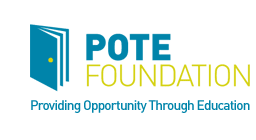Foundation Seeks Loaned Funds to Launch Early Childhood Music in Hartford
/A full page advertisement in The Hartford Courant recently sought individuals interested in “parking idle funds for education.” The open request, designed to attract funds that would enable the organization to create a free early childhood music program in Hartford, came from the POTE Foundation, Inc., a Connecticut based organization committed to providing educational support and resources to youth. POTE, which is an acronym for providing opportunity though education, promotes the vision that success is achieved when opportunity meets preparation. The organization, founded in 2007:
- provides financial and support services to all levels of the educational process—early childhood through higher education;

- strives to develop unique programs to encourage educational excellence for youth who encounter the lack of opportunity, either because of economic or intellectual barriers; and,
- engages the intellectual and financial resources of baby boomers along with corporate and foundation outreach.
The ad points out that POTE “has successfully provided cost free violin instruction to K and pre-K students in Connecticut,” noting that “early involvement in music enhances reading achievement and fosters and appreciation of music in the development of the child.”
It asks that interested individuals “grant an interest free term loan to provide investment income to fully fund enrollment” in the program, to be used to develop a learning facility in Hartford and provide investment income to fully fund enrollment. “Loan principal will not be expended for either construction or operating costs,” the organization points out. And POTE emphasizes that “all funds collected from fundraising activities go to program services – there are no administrative costs for POTE activities,” according to POTE President Christopher Wolf.
In accordance with its mission statement, during the past five years, the Glastonbury-based POTE has:
- Enrolled 90+ pre-k and kindergarten children in Suzuki cost free violin program over five years in Windsor Locks
- Provided major funding for 565 youth (ages 4 to 18) for inner city youth in the Waterbury Police Athletic League’s Safe Water Information Movement (SWIM) program
- Funded after school program for middle school youth for science, math and technology in Waterbury
- Used fees collected from consulting services, to fund $3,000 for water appreciation and nature walk for Waterbury’s West Side Middle School
- Provided $5,000 in grant funds to Hartford Conservatory for musical instrument acquisition, maintenance and repair
POTE provided $34,000 in funding for various youth educational programs during 2012.
POTE anticipates that if they are able to move forward with the new Hartford early childhood music education program, “local jobs would be created during the development phases” and the ongoing program would “employ local musicians.” In the event that the program does not go forward, all proceeds would be refunded.



































